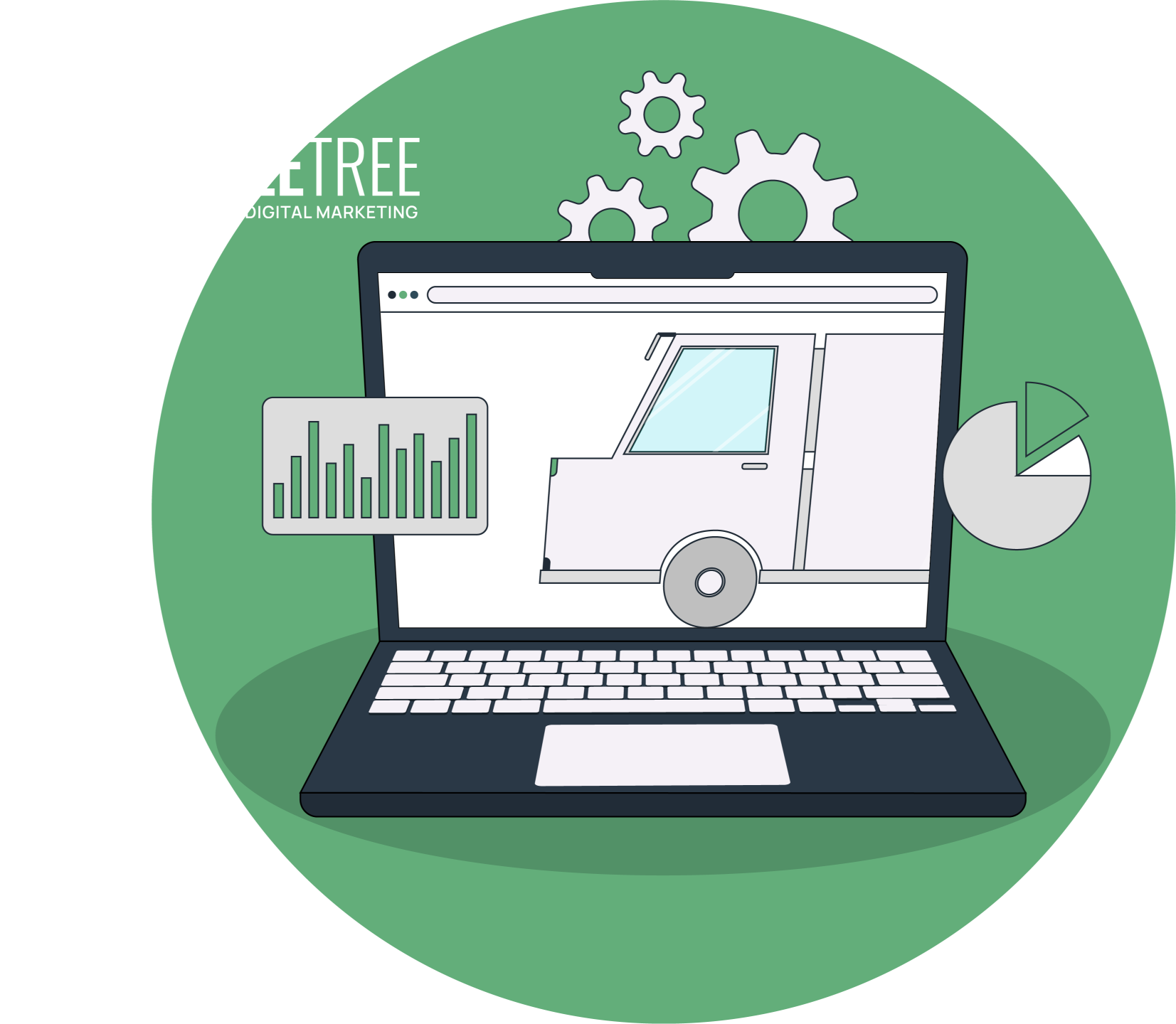In today’s competitive landscape, optimising fleet operations is no longer a luxury; it’s a necessity. Businesses with vehicle fleets, from delivery services to construction companies, face constant pressure to reduce costs and improve efficiency.
Fleet management statistics provide a treasure trove of insights, offering a clear view of driver behaviour, fuel consumption, maintenance needs, and overall productivity. By harnessing this data, companies can uncover hidden inefficiencies, make data-driven decisions, and unlock significant cost savings.
This article delves into fleet management statistics, exploring key metrics that can transform your fleet operation. We’ll uncover trends, analyse real-world examples, and provide actionable insights to help you leverage the power of data and drive your fleet towards success.
Table of Contents
What is Fleet Management?
Managing a fleet of vehicles, whether a handful of delivery vans or an extensive network of tractor-trailers, is a complex but crucial task. It’s the backbone of many businesses, ensuring goods are delivered, workers reach job sites, and services are rendered efficiently. However, keeping a fleet operational and cost-effective presents a multitude of challenges.
Challenges Faced by Fleet Managers
- Cost Control: Fuel prices fluctuate, maintenance needs arise, and unexpected repairs can affect profits. Fleet managers constantly strive to optimise costs associated with vehicle acquisition, fuel consumption, maintenance schedules, and driver behaviour.
- Driver Safety: Ensuring driver safety is paramount. This involves monitoring driver behaviour for patterns like speeding or harsh braking, implementing safety protocols, and providing ongoing driver training.
- Compliance: Many regulations govern vehicle safety, emissions, and driver service hours. Fleet managers need to stay updated on these regulations and ensure their fleets comply to avoid fines and penalties.
- Optimising Routes and Schedules: Planning efficient routes that minimise travel time and fuel consumption while meeting delivery deadlines is a constant puzzle.
The Importance of Strategic Fleet Management
A well-managed fleet offers a significant advantage in today’s competitive business environment. Here’s how:
- Reduced Costs: By implementing strategies that optimise fuel usage, minimise downtime through proactive maintenance, and negotiate better deals with fuel vendors and repair shops, fleet managers can significantly reduce operational expenses.
- Improved Efficiency: Streamlining routes, optimising schedules, and monitoring driver behaviour for better fuel economy contribute to a more efficient fleet operation. This translates to faster deliveries, improved customer satisfaction, and the ability to handle a higher volume of work.
- Enhanced Safety: Prioritising driver safety protects lives and reduces costs associated with accidents, injuries, and insurance claims.
- Regulatory Compliance: Proactive fleet management ensures adherence to regulations, avoiding potential legal issues.
Key Strategies for Effective Fleet Management
There are several key strategies that fleet managers can leverage to overcome challenges and achieve optimal fleet performance:
- Fleet Management Software: Technology plays a vital role. Fleet management software offers features like GPS tracking, fuel usage monitoring, preventative maintenance scheduling, and driver behaviour analytics. These tools provide valuable data-driven insights for informed decision-making.
- Driver Training: Ongoing training programs can improve driver safety, fuel efficiency techniques, and awareness of traffic regulations.
- Preventative Maintenance: Regular maintenance schedules help identify minor issues and address them before they escalate into costly breakdowns and minimise vehicle downtime.
- Route Optimisation: Software that plans efficient routes, considering factors like traffic congestion, road closures, and delivery times, can significantly improve efficiency and reduce fuel consumption.
The Power of Data in Fleet Management

In the fast-paced world of fleet management, intuition and guesswork simply aren’t enough. Today, data reigns supreme, fueling informed decisions and optimised operations. But what kind of data are we talking about, and how does it empower fleet managers to succeed?
Types of Fleet Management Data
Fleet management data encompasses a vast array of information collected from various sources. Here are some key categories:
- Vehicle Telematics: GPS tracking provides real-time location data, enabling route optimisation, monitoring driver behaviour (speeding, harsh braking), and identifying idling time.
- Fuel Management Data: Fuel consumption data helps analyse trends, identify fuel-efficient drivers, and pinpoint vehicles with potential fuel leaks or inefficiencies.
- Maintenance Records: Tracking maintenance history allows for proactive scheduling, preventing breakdowns, and extending vehicle lifespan.
- Driver Behavior Data: Data from in-vehicle cameras or driver monitoring systems can reveal risky behaviour patterns, allowing for targeted training and improved safety.
- Delivery and Route Data: Information on delivery schedules, stops, and completion times helps optimise routes, improve on-time delivery rates, and enhance customer satisfaction.
From Data to Decisions
By collecting and analysing this data, fleet managers gain insights that can be used to:
- Reduce Costs: Identify areas for cost savings, like optimising fuel usage, negotiating better fuel rates based on fleet consumption data, and scheduling preventive maintenance to avoid costly repairs.
- Improve Driver Safety: Analyse driver behaviour data to identify risky habits and implement targeted training programs. Real-time location data can also assist in emergencies.
- Enhance Operational Efficiency: Analyse delivery and route data to identify bottlenecks and inefficiencies. Route optimisation software powered by historical traffic patterns and delivery times can significantly improve efficiency.
- Boost Productivity: By streamlining routes, minimising downtime through proactive maintenance, and optimising driver performance, fleet managers can ensure their fleets operate at peak productivity.
- Gain a Competitive Edge: Data-driven insights enable fleet managers to make informed decisions that improve efficiency, reduce costs, and enhance customer service, giving them a competitive advantage.
Fleet Management Statistics for 2023-2024

In 2024, data reigns supreme in fleet management. But to truly leverage its power, we need to delve deeper. Here’s a breakdown of key fleet management statistics across various crucial areas:
Cost Management
- Fuel Costs: The average cost of diesel fuel in the US in 2023 was around $5.20 per gallon. Analysts predicted an increase in fuel costs for 2024 due to factors like production cuts by OPEC+ and rising global oil prices. Early data from the EIA suggests that the national average diesel prices might be trending higher than in 2023.
- Technology Adoption Impact: A 2023 report by ABI Research predicted that the global market for fleet management software would reach $38.5 billion by the end of the year. Expect this trend to accelerate in 2024, with companies leveraging software to potentially reduce fuel consumption by 5-10% through route optimisation
Driver Safety
According to a 2023 survey by Azuga, 62% of fleet managers cited safe vehicle operation as their top priority, reflecting a growing emphasis on safety programs. This trend is expected to continue in 2024 with the continued use of driver behaviour analytics to identify areas for improvement and reduce accidents.
Operational Efficiency
- Route Optimisation: In 2023, Inrix studied route optimisation software and found that it can reduce delivery times by an average of 10%. This trend is expected to continue in 2024 with the rise of AI-powered solutions that can factor in real-time data for even greater efficiency gains.
- Telematics Growth: According to a report by Berg Insight, the number of commercially active telematics units globally reached 80 million in 2023. This trend is expected to continue in 2024 as companies seek real-time data for better decision-making on maintenance schedules and driver behaviour.
Technology Adoption
- Software Growth: The global fleet management software market was estimated to be valued at $25.5 billion in 2023. Expect this trend to continue in 2024, with forecasts predicting a market size exceeding $52.4 billion by 2027.
- Focus on ROI: A 2023 study by Frost & Sullivan found that companies using fleet management software saw an average return on investment (ROI) of 300%. This trend is expected to continue in 2024 as companies see the tangible benefits of data-driven fleet management solutions.
Successful Fleet Management Applications
- FedEx: A giant in the logistics industry, FedEx is known for its focus on efficiency and route optimisation. They leverage telematics data and route planning software to ensure timely deliveries while minimising fuel consumption and driver fatigue.
- Amazon: Another leader in logistics, Amazon utilises a massive fleet of delivery vehicles. They’ve reportedly implemented AI-powered route optimisation and delivery scheduling systems to streamline operations and meet their ever-growing delivery demands.
- UPS: UPS is another major logistics player that prioritises data-driven fleet management. They reportedly use telematics data to monitor driver behaviour, pinpoint opportunities for skill development and formulate personalised training programs that maximise driver safety and efficiency.
- J B Hunt Transport Services: This prominent trucking company leverages fleet management software to track vehicle location, monitor driver performance, and optimise real-time routes. This allows them to reduce costs, improve on-time delivery rates, and enhance customer satisfaction.
- PepsiCo: PepsiCo utilises a large fleet of delivery trucks across the globe. They reportedly implemented route optimisation software that considers factors like traffic congestion and weather patterns, resulting in significant fuel cost savings and improved delivery times.
Future Trends in Fleet Management
The fleet management landscape constantly evolves, driven by technological advancements and a growing focus on sustainability and efficiency. Here’s a glimpse into some of the key trends shaping the future of the industry:
Rise of Electric Vehicles (EVs) and Alternative Fuels
With increasing environmental concerns and government incentives, the adoption of electric vehicles (EVs) and alternative fuels like biodiesel and compressed natural gas (CNG) is expected to accelerate. Fleet managers must adapt to new charging infrastructure, maintenance requirements, and potential range limitations of EVs.
Sustainability Comes to the Forefront
Eco-friendly practices will be a significant focus. This includes not only adopting EVs and alternative fuels but also optimising routes for reduced emissions, implementing idle reduction technologies, and prioritising sustainable sourcing for parts and materials.
Integration of Artificial Intelligence (AI)
AI is poised to revolutionise fleet management. Predictive maintenance powered by AI can proactively analyse sensor data to anticipate equipment failures and schedule maintenance, minimising downtime and costs. AI-powered route optimisation will further enhance efficiency by factoring in real-time traffic data and dynamic weather patterns.
The Autonomous Future (with a caveat)
While fully autonomous vehicles are still on the horizon, expect advancements in Advanced Driver-Assistance Systems (ADAS) like lane departure warnings and automatic emergency braking. These features can significantly improve driver safety and potentially reduce accidents. However, due to regulatory and technological hurdles, fully autonomous trucks and delivery vehicles are likely still several years away.
Focus on Cybersecurity
As fleets increasingly rely on connected technologies, cybersecurity threats will become a growing concern. Fleet managers must implement robust cybersecurity protocols to safeguard sensitive data from cyberattacks.
Data-Driven Decisions Remain at the Core
Data’s importance will only increase. Fleet managers will leverage advanced analytics platforms to glean deeper insights from a broader range of data points, enabling them to decide on everything from route optimisation and driver behaviour to fuel efficiency and preventative maintenance.
Conclusion
Data analysis is no longer a luxury; it’s a necessity. By harnessing the power of data, fleet managers can transform reactive operations into proactive ones, steering their fleets towards a future of success. In addition, by embracing new technologies and implementing best practices, fleet managers can ensure their operations are running smoothly, efficiently, and sustainably, propelling their businesses towards continued thriving.


